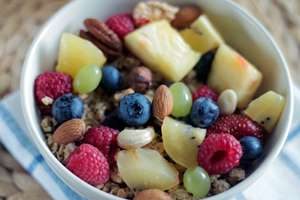Fiber, a substance found in fruits, vegetables and grains, plays a very important role in our diet. It facilitates digestion and helps prevent constipation, thus maintaining good bowel health. It also adds bulk to your diet, making you feel full faster and stay satisfied longer. But aside from those, a recent study published in The Journals of Gerontology shows the link between the right amount of fiber in the diet and healthy aging.
The researchers behind this study examined the data of healthy 1,609 adults aged 49 and older, who were free of cancer, coronary artery disease and stroke, and were followed for 10 years. “Successful aging” was determined as the absence of disability, depressive symptoms, cognitive impairment, respiratory symptoms and chronic diseases. The result of the study was based on the data collected from interviewer-administered questionnaires conducted during each visit.
Results:
In all, 249 (15.5%) participants had aged successfully 10 years later. Participants in the highest versus lowest (reference group) quartile of total fiber intake had greater odds of aging successfully than suboptimal aging, multivariable-adjusted odds ratio (OR), 1.79 (95% confidence interval [CI] 1.13–2.84).
Those who remained consistently below the median in consumption of fiber from breads/cereal and fruit compared with the rest of cohort were less likely to age successfully, OR 0.53 (95% CI 0.34–0.84) and OR 0.64 (95% CI 0.44–0.95), respectively.
Therefore, the findings suggest that increasing your fiber intake can help you reach old age disease free and fully functional.
Now that we know how fiber contributes to successful aging, here’s a list of fiber-rich foods to add to your diet. Remember, adults are recommended to eat 21-38 grams of fiber each day.
- Split Peas Fiber: 16.3 grams per cup, cooked.
- Lentils Fiber: 15.6 grams per cup, cooked.
- Black Beans Fiber: 15 grams per cup, cooked.
- Artichokes Fiber: 10.3 grams per medium vegetable, cooked.
- Peas Fiber: 8.8 grams per cup, cooked.
- Broccoli Fiber: 5.1 grams per cup, boiled.
- Brussels Sprouts Fiber: 4.1 grams per cup, boiled.
- Raspberries Fiber: 8 grams per cup, raw.
- Blackberries Fiber: 7.6 grams per cup, raw.
- Avocados Fiber: 6.7 grams per half, raw.
- Bran Flakes Fiber: 7 grams per cup, raw.
- Whole-Wheat Pasta Fiber: 6.3 grams per cup, cooked.
- Pearled barley Fiber: 6 grams per cup, cooked.
- Oatmeal Fiber: 4 grams per cup, cooked.
Source: Greatist.com
With all the food options listed above, it’s not hard to incorporate fiber to your meals and snacks. Sticking to a high-fiber diet is also a great way to manage and control your weight.










